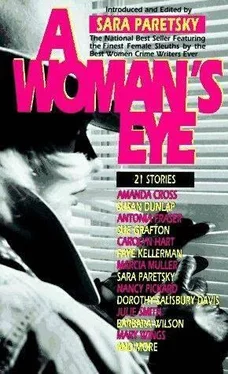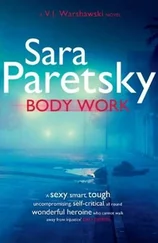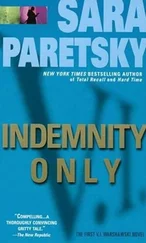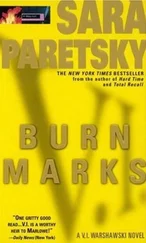Sara Paretsky - A Woman’s Eye
Здесь есть возможность читать онлайн «Sara Paretsky - A Woman’s Eye» весь текст электронной книги совершенно бесплатно (целиком полную версию без сокращений). В некоторых случаях можно слушать аудио, скачать через торрент в формате fb2 и присутствует краткое содержание. Жанр: Триллер, на английском языке. Описание произведения, (предисловие) а так же отзывы посетителей доступны на портале библиотеки ЛибКат.
- Название:A Woman’s Eye
- Автор:
- Жанр:
- Год:неизвестен
- ISBN:нет данных
- Рейтинг книги:3 / 5. Голосов: 1
-
Избранное:Добавить в избранное
- Отзывы:
-
Ваша оценка:
- 60
- 1
- 2
- 3
- 4
- 5
A Woman’s Eye: краткое содержание, описание и аннотация
Предлагаем к чтению аннотацию, описание, краткое содержание или предисловие (зависит от того, что написал сам автор книги «A Woman’s Eye»). Если вы не нашли необходимую информацию о книге — напишите в комментариях, мы постараемся отыскать её.
A Woman’s Eye — читать онлайн бесплатно полную книгу (весь текст) целиком
Ниже представлен текст книги, разбитый по страницам. Система сохранения места последней прочитанной страницы, позволяет с удобством читать онлайн бесплатно книгу «A Woman’s Eye», без необходимости каждый раз заново искать на чём Вы остановились. Поставьте закладку, и сможете в любой момент перейти на страницу, на которой закончили чтение.
Интервал:
Закладка:

Sara Paretsky, Liza Cody, Sue Grafton, Marcia Muller, Dorothy Salisbury Davis, Nancy Pickard, Amanda Cross, Faye Kellerman, Antonia Fraser, Julie Smith, Barbara Wilson, Susan Dunlap, Mary Wings, Marilyn Wallace, Gillian Slovo, Margaret Maron, Shelley Singer, Carolyn G. Hart, Carolyn Wheat, Maria Antonia Oliver, Dorothy B. Hughes
A Woman’s Eye
Copyright © 1991 by Sara Paretsky and Martin H. Greenberg
EYE OF A WOMAN an introduction by Sara Paretsky
“My dear, you are a young woman. You are writing about a book that has been written by a man. Be sympathetic; be tender; flatter; deceive; use all the arts and wiles of our sex. Never let anybody guess that you have a mind of your own.”
The Angel in the House spoke these words to Virginia Woolf when Woolf first tried to write for publication. The Angel was a phantasm, but its speech crystallized all the voices Woolf had heard from childhood on, telling her that women should never have a mind or wish of their own. Woolf says she struggled with this Angel for years, trying to kill it so that she could find her own voice. “She died hard,” the artist reports. “Her fictitious nature was of great assistance to her. It is far harder to kill a phantom than a reality.”
Women have been wrestling with that Angel for many centimes. It is a difficult phantom to overpower because it speaks in so many voices and with so much authority behind it. In some cases the authority is quite specific. John Winthrop, the first governor of Massachusetts Bay, wrote in 1645 that the poet Anne Hopkins “has fallen into a sad infirmity, the loss of her understanding and reason,… by occasion of giving herself wholly to reading and writing, and had written many books.” He added that “if she had attended her household affairs, and such things as belong to women… she had kept her wits.”
This kind of authority, this active pressure to keep women doing “such things as belong to women,” made it difficult for women to join the ranks of storytellers. Of course, we all look admiringly at the poet Sappho-all except the Athenian men who destroyed much of her work because she was praised more highly than their favorite Pindar. And we see the Lady Murasaki, the eleventh-century creator of the first novel, whose father-recognizing her talent-lamented she had not been born a boy. She only had the minor hurdle of learning to write by secretly looking over her brothers’ shoulders-her lamenting father had forbidden her direct education.
By 1700 we find more than one woman writer per century, but to see a continuous chain of female storytellers we can look back only two hundred years. During those two centuries women struggled hard for the right to be published and read. In the nineteenth century they often wrote under men’s names to gain an audience-Acton, Currer, and Ellis Bell for the Bronte sisters; George Eliot for Mary Ann Evans; and George Sand for Lucie Dupin Dudevant. George Sand wrote most of her enormous oeuvre at night, starting work at two or three in the morning after finishing with the management of her large household or her numerous lovers. And it is only in this century that we find enough women writing that we no longer see ourselves as odd, or worry, like the seventeenth-century poet Anne Finch, that the masculine art of poetry is making us crabbed and unwomanly.
In some cases, women struggling to express themselves faced a bombardment of wholesale anger-furious reviews, social ostracism, public excoriation-so intense that they stopped writing. Kate Chopin experienced this reaction after publishing The Awakening in 1899. The anger against her was so intense that she wrote nothing else for publication. She died five years later at the age of fifty-three, broken by the forcible silencing of her voice.
Edna Pontellier, the heroine of The Awakening, married, with two children, leaves her husband in order to paint-and in so doing falls in love with a younger man. She commits suicide in the end, but this fate did not exonerate her or her creator, either in 1900 or today. Over and over reviewers have castigated Chopin for Edna’s “selfishness.” In 1970 George Spangler condemned Chopin for Edna’s “ruthless determination to go her own way” that is “disturbing, even alienating.”
Contrast Chopin’s fate, and that of her heroine, with Goethe and Faust. At the end of a long life of debauchery Faust “ist gerichtet, ist gerettet” -he is judged and saved-a fate his creator, who glorified his own numerous seductions in poems and journals, no doubt expected for himself. Do any biographers of Goethe take him to task for “selfishness” or find Faust “disturbing, even alienating”? The strong expression of sexual desire is not just condoned in the male hero-it makes him more heroic.
In a woman that desire is a sign at best of selfishness, at worst of psychosis. The character Glenn Close plays in Fatal Attraction, Alex Forrest, shows that we still find female sexuality-outside of marriage, and specifically married maternity-so shocking and debasing that the character must be deranged. And as with Chopin’s Edna Pontellier, the only fitting end for Alex Forrest is death.
It is the struggle to find a voice, to kill the Angel, to figure out what women really want, what our stories really are, that absorbs the energy of many women writers. The voices that tell us we can’t do it, or we shouldn’t do it, continue to blare at us. They may be loud and raucous, like Norman Mailer, addressing International PEN a few years ago while head of PEN USA, and saying that it isn’t possible for women to write as well as men. It’s not hard to imagine what threat women present to Mailer’s vision of his masculinity that drives him to insist that you “have to have balls” to write well; it is hard to understand why an organization dedicated to freeing imprisoned writers should elect him president.
Mailer’s statements are so extreme that many people laugh at him, but he’s far from alone in pushing down women’s voices. Other people merely express themselves more softly. Women who write strong, even angry stories are no longer told that they are “unwomanly” or “selfish.” Today, as Carolyn Heilbrun points out, we hear that we are “shrill,” “strident,” or, worst of all, feminists. We also find most women excluded from the sacred mystical canon that Allan Bloom, Mortimer Adler, and others keep firing. And a Chicago area critic recently explained that feminists by definition cannot write great books.
In addition to needing considerable courage even to tell stories, we women have also had to figure out what our stories are. The image of ourselves as inconstant, duplicitous, stupid, illogical, using our bodies to seduce and subvert men is such an ancient, ingrained part of our tradition, reinforced in fairy tales, epics, history, that to counteract these images by telling women’s stories makes for very heavy work. Writers as different as George Eliot and Virginia Woolf suffered from migraines brought on by the stress of this work and the self-doubts that come from countering so widely accepted an authority.
It was Virginia Woolf who first clearly spelled out the central problem of the female artist: the conflict between her interior vision and the expectation that she subordinate that vision to her perceived primary role as a self-sacrificing angel.
Just being able to articulate this problem was an important step toward resolving it, But many women artists-including the crime writercontinue to experience stress in taking their own visions seriously. Agatha Christie, who wrested total artistic control for production from her publishers in the twenties, and whose residuals brought in over a million pounds a year at her death, often told reporters that she regarded herself as a wife first, a writer second. One should take this statement seriously: as a sign not of poor-mouthing, but of internal conflict between her success and what she thought her womanly role should be.
Читать дальшеИнтервал:
Закладка:
Похожие книги на «A Woman’s Eye»
Представляем Вашему вниманию похожие книги на «A Woman’s Eye» списком для выбора. Мы отобрали схожую по названию и смыслу литературу в надежде предоставить читателям больше вариантов отыскать новые, интересные, ещё непрочитанные произведения.
Обсуждение, отзывы о книге «A Woman’s Eye» и просто собственные мнения читателей. Оставьте ваши комментарии, напишите, что Вы думаете о произведении, его смысле или главных героях. Укажите что конкретно понравилось, а что нет, и почему Вы так считаете.












